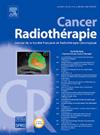Recommandations de l’Association francophone pour les soins oncologiques de support et de la Société française de radiothérapie oncologique relatives aux effets secondaires respiratoires radio-induits
IF 1.4
4区 医学
Q4 ONCOLOGY
引用次数: 0
Abstract
Purpose
Radiation-induced lung injury is relatively uncommon but disabling, and a dose-limiting factor in thoracic radiotherapy. This complication is mainly encountered following radiotherapy for lung cancers. We provide recommendations for good clinical practice, defining the prevention and management of radiation-induced lung injury.
Methods
Members of the Association francophone pour les soins oncologiques de support (Afsos; French-speaking association for oncology care and support) and the Société française de radiothérapie oncologique (SFRO, French society for radiation oncology) set up a multidisciplinary working and review group to draft these recommendations for 2023 to 2024, based on a systematic review of the literature.
Results
Radiation-induced lung injury comprises several forms, mainly resulting from acute toxicity (radiation pneumonitis) and chronic toxicity (radiation fibrosis). Specific forms can be identified, such as organising pneumonia (formerly bronchiolitis obliterans organizing pneumonia) and radiation recall pneumonia. The risk factors are numerous and include dosimetric risk factors, patient-related factors and tumour-related factors. New challenges include the specific complications of stereotactic radiotherapy, the combination of recent specific oncological treatments including tyrosine kinase inhibitors and immunotherapy, and the association with certain pathologies such as interstitial lung disease.
Conclusion
The profile of radiation-induced lung injury is evolving with new radiotherapy techniques and innovative systemic oncology treatments. Rapid detection and management of these side-effects are essential for good patient care.
法语肿瘤辅助治疗协会和法国肿瘤放射治疗协会关于辐射引起的呼吸系统副作用的建议
目的:放射引起的肺损伤是相对罕见的,但致残性,是胸部放射治疗的剂量限制因素。这种并发症主要发生在肺癌放疗后。我们为良好的临床实践提供建议,定义了放射性肺损伤的预防和管理。方法法语国家肿瘤学会(Afsos)会员;法语肿瘤护理和支持协会)和法国放射肿瘤学会(SFRO,法国放射肿瘤学会)成立了一个多学科工作和审查小组,根据对文献的系统审查,起草2023年至2024年的这些建议。结果放射性肺损伤主要表现为急性毒性(放射性肺炎)和慢性毒性(放射性纤维化)。可识别特定形式,如组织性肺炎(原闭塞性细支气管炎组织性肺炎)和辐射回忆性肺炎。危险因素很多,包括剂量学危险因素、患者相关因素和肿瘤相关因素。新的挑战包括立体定向放疗的特定并发症,最近的特定肿瘤治疗(包括酪氨酸激酶抑制剂和免疫治疗)的组合,以及与某些病理(如间质性肺疾病)的关联。结论随着新的放疗技术和创新的全身肿瘤治疗方法的发展,放射性肺损伤的情况正在发生变化。快速发现和处理这些副作用对于良好的患者护理至关重要。
本文章由计算机程序翻译,如有差异,请以英文原文为准。
求助全文
约1分钟内获得全文
求助全文
来源期刊

Cancer Radiotherapie
医学-核医学
CiteScore
2.20
自引率
23.10%
发文量
129
审稿时长
63 days
期刊介绍:
Cancer/radiothérapie se veut d''abord et avant tout un organe francophone de publication des travaux de recherche en radiothérapie. La revue a pour objectif de diffuser les informations majeures sur les travaux de recherche en cancérologie et tout ce qui touche de près ou de loin au traitement du cancer par les radiations : technologie, radiophysique, radiobiologie et radiothérapie clinique.
 求助内容:
求助内容: 应助结果提醒方式:
应助结果提醒方式:


